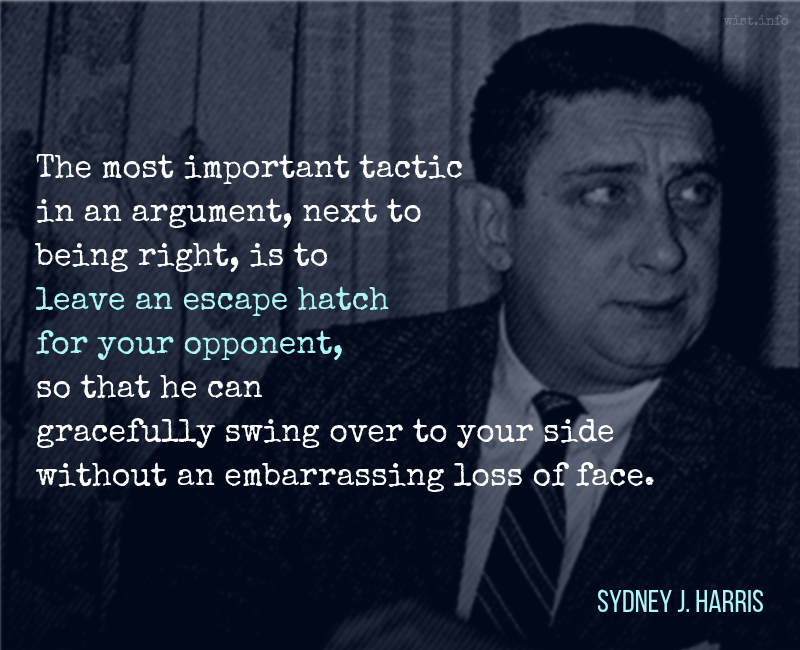The natural approach to human relations presumes that to know any person well enough is to love him, and that, therefore, the only human problem is a communication problem. It refuses to admit the possibility that people might be separated by basic, deeply held, genuinely irreconcilable differences — philosophical, political, or religious. Thus, the effort to trivialize etiquette as being a barrier to the happy mingling of souls, actually trivializes intellectual, emotional, and spiritual convictions by characterizing any difference between one person’s and another’s as no more than a simple misunderstanding, easily solved by frank exchanges or orchestrated “encounters.”
Judith Martin (b. 1938) American author, journalist, etiquette expert [a.k.a. Miss Manners]
Common Courtesy, “In the Quest for Equality, Civilization Itself Is Maligned” (1985)
(Source)
Originally published in The New Republic in 1984.
Quotations about:
reconciliation
Note not all quotations have been tagged, so Search may find additional quotes on this topic.
Satan’s greatest sin, his greatest mistake, wasn’t pride or rebelling against God. His greatest mistake was believing that God would not forgive him if he asked for forgiveness. His sin wasn’t just pride — it was self-pity. I think in some ways every single person, human, vampire, whatever, has a choice to make: to be full of rage about what happens to you or to reconcile with it, to strive for the most honorable existence you can despite the odds. Do you believe in a God who understands and forgives or one who doesn’t? What it comes down to is, this is between you and God, and you’ll have to work that out for yourself.
There seems a magic in the very name of Christmas. Petty jealousies and discords are forgotten; social feelings are awakened in bosoms to which they have long been strangers; father and son, or brother and sister, who have met and passed with averted gaze, or a look of cold recognition, for months before, proffer and return the cordial embrace, and bury their past animosities in their present happiness.
Charles Dickens (1812-1870) English writer and social critic
Sketches by Boz, “Characters,” ch. 2 “A Christmas Dinner” (1833-36)
(Source)
CREON: A foe, though dead, should as a foe be treated still.
ANTIGONE: My love shall go with them, but not my hate.Κρέων: οὔτοι ποθ᾽ οὑχθρός, οὐδ᾽ ὅταν θάνῃ, φίλος.
Ἀντιγόνη: οὔτοι συνέχθειν, ἀλλὰ συμφιλεῖν ἔφυν.Sophocles (496-406 BC) Greek tragic playwright
Antigone, l. 522ff (441 BC) [tr. Werner (1892)]
(Source)
Original Greek. Alt. trans.:
KREON: The foe is ne'er a friend -- not e'en in death.
ANTIGONE: My heart is love's co-mate, not hatred's partner.
[tr. Donaldson (1848)]
CREON: Not even death can make a foe a friend.
ANTIGONE: My nature is for mutual love, not hate.
[tr. Storr (1859)]
CREON: You do not love someone you have hated, not even after death.
ANTIGONE: It is not my nature to join in hate, but in love.
[tr. Jebb (1891)]
CREON: A foe is never a friend -- not even in death.
ANTIGONE: 'Tis not my nature to join in hating, but in loving.
[tr. Jebb (1917)]
CREON: An enemy is an enemy, even dead.
ANTIGONE: It is may nature to join in love, not hate.
[tr. Fitts/Fitzgerald (1939)]
CREON: An enemy can't be a friend, even when dead.
ANTIGONE: My way is to share my love, not share my hate.
[tr. Watling (1947), ll. 441-42]
CREON: No enemy will become a friend in the Underworld.
ANTIGONE: I am for sharing love, not hatred.
[tr. Theodoridis (2004)]
CREON: An enemy
can never be a friend, not even in death.
ANTIGONE: But my nature is to love. I cannot hate.
[tr. Johnston (2005), ll. 596-98]
CREON: An enemy is not a friend, even when dead.
ANTIGONE: I cannot share their hate, only their love.
[tr. Thomas]
The most important tactic in an argument, next to being right, is to leave an escape hatch for your opponent, so that he can gracefully swing over to your side without an embarrassing loss of face.
Sydney J. Harris (1917-1986) Anglo-American columnist, journalist, author
Pieces of Eight (1982)
(Source)
Frequently misquoted: "The most important thing in an argument, next to being right, is to leave an escape hatch for your opponent, so that he can gracefully swing over to your side without too much apparent loss of face."
Forgiveness does not mean ignoring what has been done or putting a false label on an evil act. It means, rather, that the evil act no longer remains as a barrier to the relationship. Forgiveness is a catalyst creating the atmosphere necessary for a fresh start and a new beginning. It is the lifting of a burden or the canceling of a debt. The words “I will forgive you, but I’ll never forget what you have done” never explain the real nature of forgiveness. Certainly one can never forget, if that means erasing it totally for his mind. But when we forgive, we forget in the sense that the evil deed is no longer a mental block impeding a new relationship. Likewise, we can never say, “I will forgive you, but I won’t have anything further to do with you.” Forgiveness means reconciliation, a coming together again. Without this, no man can love his enemies. The degree to which we are able to forgive determines the degree to which we are able to love our enemies.
Martin Luther King, Jr. (1929-1968) American clergyman, civil rights leader, social activist, preacher
“Loving Your Enemies,” Sermon, Dexter Avenue Baptist Church, Montgomery (25 Dec 1957)
(Source)
Not to be confused with a similarly-named sermon preached on 17 November of the same year. This sermon was reprinted in Strength to Love (1963)
‘Tis much safer for thee to reconcile an Enemy than conquer him. Victory may deprive him of his Power for the present; but Reconciliation disarms his Will.
Thomas Fuller (1654-1734) English physician, preacher, aphorist, writer
Introductio ad Prudentiam, # 782 (1725)
(Source)








